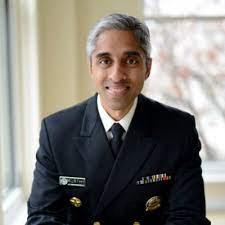
INDIANA – The challenges today’s generation of young people face are unprecedented and uniquely hard to navigate and challenges on their mental health are devastating. This reporter knows this all too well. In an effort to address these challenges WBIW will be looking at these challenges in a series of stories.
Recent national surveys of young people have shown alarming increases in the prevalence of certain mental health challenges. In 2019, one in three high school students and half of the female students reported persistent feelings of sadness or hopelessness, an overall increase of 40% from 2009.

Vice Admiral, U.S. Public Health Service Surgeon General
“We know that mental health is shaped by many factors, from our genes and brain chemistry to our relationships with family and friends, neighborhood conditions, and larger social forces and policies,” said Vivek H. Murthy, M.D., M.B.A. Vice Admiral, U.S. Public Health Service Surgeon General of the United States in the Protecting Youth’s Mental Health report. “We also know that, too often, young people are bombarded with messages through the media and popular culture that erodes their sense of self-worth – telling them they are not good-looking enough, popular enough, smart enough, or rich enough.”
While technology platforms have improved our lives in important ways, increasing our ability to build new communities, deliver resources, and access information, health officials know that, for many people, they can also have adverse effects.

“When not deployed responsibly and safely, these tools can pit us against each other, reinforce negative behaviors like bullying and exclusion, and undermine the safe and supportive environments young people need and deserve,” Dr. Murthy added. “All of that was true even before the COVID-19 pandemic dramatically altered young peoples’ experiences at home, at school, and in the community.”
According to health officials, the pandemic era’s unfathomable number of deaths, pervasive sense of fear, economic instability, and forced physical distancing from loved ones, friends, and communities have exacerbated the unprecedented stresses young people already faced.

“It would be a tragedy if we beat back one public health crisis only to allow another to grow in its place,” Dr. Muthry said. “Mental health challenges in children, adolescents, and young adults are real, and they are widespread. But most importantly, they are treatable, and often preventable. To be sure, this isn’t an issue we can fix overnight or with a single prescription. Ensuring healthy children and families will take an all-of society effort, including policy, institutional, and individual changes in how we view and prioritize mental health.”
Over the following weeks, WBIW will be looking at the Surgeon General’s Advisory. This Advisory provides actionable recommendations for young people and their families, schools and health care systems, technology and media companies, employers, community organizations, and governments alike.
According to Muthry, our obligation to act is not just medical – it’s moral.
“I believe that coming out of the COVID-19 pandemic, we have an unprecedented opportunity as a country to rebuild in a way that refocuses our identity and common values puts people first and strengthens our connections to each other. If we seize this moment, step up for our children and their families in their moment of need, and lead with inclusion, kindness, and respect, we can lay the foundation for a healthier, more resilient, and more fulfilled nation,” Dr. Muthry added.



